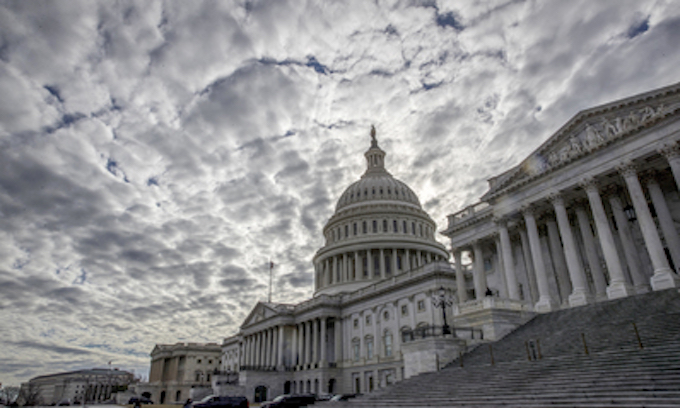House Republicans must contend with a growing list of retirements in their quest to retake the majority in the November elections.
Republicans are losing 25 lawmakers who won’t be running for reelection in the House or are seeking another office. Nine Democrats are calling it quits.
“Members retire for many different reasons, but an overarching theme is this: It’s just not much fun to serve in the minority,” Kyle Kondik, managing editor for Sabato’s Crystal Ball, told The Washington Times.
Additionally, each party had one member resign in scandal.
Rep. Duncan Hunter, California Republican, is set to bow out when Congress returns from its Christmas break after pleading guilty to campaign finance violations. Democratic Rep. Katie Hill, also of California, resigned amid a House ethics investigation into multiple allegations that she engaged in romantic relationships with staffers. The charges were amplified by the publication of nude photos of her smoking a bong and combing the hair of a 22-year-old female staffer. Ms. Hill called it a smear campaign.
The number of retirements so far match the pace of the run-up to the 2018 midterm elections.
Ahead of the midterms, 23 House Republicans and three Senate Republicans stepped away from Capitol Hill. One was House Speaker Paul D. Ryan of Wisconsin.
Democrats had eight retirements heading into the midterms.
Unlike their current circumstances, Republicans held the House and were two years into having a lock on Washington power with control also of the White House and the Senate.
The Republican leadership team generally doesn’t show public concern about the high number of retirements, even as analysts suggest it’s a sign of pessimism among their ranks.
House Minority Leader Kevin McCarthy of California, however, said he is not concerned. He noted that most of the retirements come from solidly Republican districts.
“The health of our party is very strong,” he said. “The thing about the Republican Party, we don’t believe this should be your entire life.”
Mr. McCarthy said retirements, while sad, leave room for new members to reinvigorate the party. As an example, he pointed to Rep. Dan Crenshaw of Texas, who replaced Rep. Ted Poe in 2018.
“I never met a man named Dan Crenshaw before — this new, young Navy SEAL who’s now probably the strongest Republican on social media talking about policies,” he said.
Across the aisle, the Democrats’ campaign arm sees opportunity in the Republican retirements.
“Republican leadership might not have given up on retaking the House, but clearly their members have,” said Robyn Patterson, spokeswoman for Democratic Congressional Campaign Committee, which is tasked with recruiting and electing Democrats to the House. “Washington Republicans have been outraised, outworked and are exhausted from sweeping Trump’s abuses of power under the rug. That’s why so many of them are headed for the exits.”
Most recently, Rep. Mark Meadows of North Carolina, former chairman of the conservative House Freedom Caucus, stunned many in Washington with his decision to not run for reelection.
Mr. Meadows, a close ally of President Trump, has been front and center in arguing against impeachment. He announced his decision the day Mr. Trump was impeached in the House.
He could be tapped to help the president in some capacity next year, but Mr. Meadows called discussion about details of his plans premature.
He set a retirement date at the end of his current term.
“Some of our focus will be on helping the president get his agenda done, legislatively done here, getting him reelected,” he told The Washington Times. “If there’s other priorities and other opportunities, I’ll have to weigh those as they come in.”
The DCCC touted Mr. Meadows’ departure as a sign of waning morale in the House minority.
But most of the seats where Republicans are retiring are in safe districts for the party, including Mr. Meadows’ North Carolina district.
“My seat will be a Republican,” Mr. Meadows told The Times. “And so I think reading anything into my decision, other than it was the time and the season for me to exit, would be misdirected.”
Although Republicans are now on the offensive — looking to chip off 19 seats from vulnerable Democrats — the open districts could fare better for Democrats.
At Crystal Ball’s last count in late November, which leaves out a handful of new retirements, eight of the 28 races without incumbents were deemed to be competitive.
Republicans need to defend all but one of those seats, the one occupied by Rep. David Loebsack in Iowa.
In particular, Republicans were hit with a wave of retirements from Texas dubbed “Texodus.” Three of those seats are considered competitive, and one is being vacated by Rep. Will Hurd, the party’s only black House member.
“So Democrats have more potential to gain from open seats than Republicans do, particularly when one takes the new North Carolina map into account,” Mr. Kondik said.
Although Mr. Meadows’ seat appears safe, the districts of two of his fellow North Carolinians — Reps. George Holding and Mark Walker — are leaning toward Democratic victories.
Mr. Walker is considering a bid for Richard Burr’s Senate seat in 2022. Mr. Holding hasn’t detailed his goals to return to public office.
“I should add, candidly, that yes, the newly redrawn congressional districts were part of the reason I have decided not to seek reelection,” Mr. Holding said when he announced his retirement. “But, in addition, this is also a good time for me to step back and reflect on all that I have learned.”
© Copyright (c) 2020 News World Communications, Inc.
—-
This content is published through a licensing agreement with Acquire Media using its NewsEdge technology.



















Recent Comments